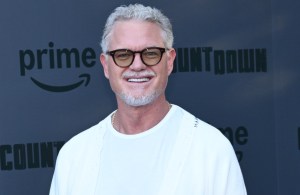Tom Hanks has taken a stand against shady advertisers exploiting his persona to promote questionable health products. In a recent Instagram post, Hanks alerted his followers to a wave of deceptive advertisements utilizing artificial intelligence (AI) to mimic his likeness and voice.
“There are multiple ads over the internet falsely using my name, likeness and voice promoting miracle cures and wonder drugs,” Hanks declared in his statement. He emphasized that these advertisements were “created without my consent, fraudulently and through AI.”
Videos by PopCulture.com
The Oscar-winning actor, known for his roles in films like Forrest Gump and Cast Away, stressed his non-involvement with these promotional materials. “I have nothing to do with these posts or the productions and treatments, or the spokespeople touting these cures,” he asserted.
Hanks, who has been open about his type 2 diabetes diagnosis, urged his fans to exercise caution. “I ONLY work with my board certified doctor regarding my treatment. DO NOT BE FOOLED. DO NOT BE SWINDLED. DO NOT LOSE YOUR HARD EARNED MONEY,” he warned.
This isn’t the first time Hanks has confronted such issues. In October, he alerted fans to a dental company scam using an AI version of him, cautioning his fans to “beware” at the time. “There’s a video out there promoting some dental plan with an AI version of me. I have nothing to do with it,” he wrote on Instagram.
The actor’s experience highlights a growing concern in the entertainment industry about the misuse of AI technology. In response, California lawmakers have proposed legislation to protect performers’ rights. Two bills, AB 1836 and AB 2602, aim to give actors more control over how their likeness is used, even after death, reported Fortune.
These legislative efforts, co-sponsored by the actors’ union SAG-AFTRA, seek to address the threat posed by “digital replicas” to Hollywood jobs. The bills would require explicit approval for using a performer’s likeness and allow actors to prevent their work from being used to train AI systems.
Tim Friedlander, director of the National Association of Voice Actors, emphasized to the outlet the importance of such protections, especially for non-union voice actors, who make up over 80% of the industry. Friedlander stressed the potential impact of AI on voice actors, stating, “We don’t want to be training our competition.”
He further elaborated on the significance of the proposed legislation: “These sorts of laws are important for anyone who has recorded audio.” Friedlander explained that without such protections, voice actors’ work could be “used and retooled by AI beyond its original purpose.”
Most Viewed
-

Beverly Hills, CA – January 31, 2026: Jelly Roll, left, and Bunnie Xo, right, pose for portraits on the red carpet during the 68th GRAMMY Awards Pre-GRAMMY Gala & GRAMMY Salute to Industry Icons Honoring Avery Lipman & Monte Lipman at the Beverly Hilton on Saturday, Jan. 31, 2026 in Beverly Hills, CA. Clive Davis’ annual pre-Grammy party hosts an array of A-listers from entertainment, sports, and politics to come together and enjoy performances. (Kayla Bartkowski/ Los Angeles Times)







